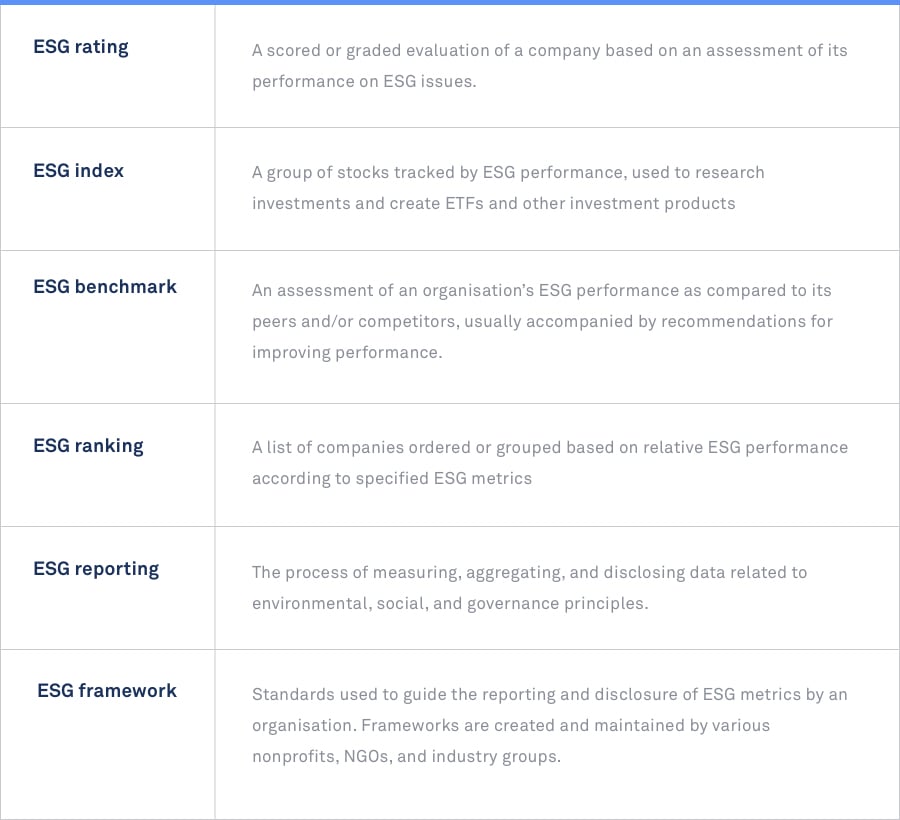What is ESG reporting?
ESG reporting is the process of measuring, aggregating, and disclosing data related to environmental, social, and governance principles.
ESG reporting lets businesses, investment funds, governments, and other entities demonstrate sustainability performance and track their progress over time.
Most of the time, organisations rely on ESG frameworks to help them decide what to report on, how to calculate quantitative data, and how to disclose ESG metrics.
There are many different ESG frameworks that offer standards for ESG reporting. Usually created by nonprofits, NGOs, and business groups, these frameworks might be voluntary or required by investors or regulators.
Here’s a sample of some leading ESG frameworks. For a complete breakdown of the most popular ESG reporting frameworks, download our ESG Framework Guide.
- Global Reporting Initiative (GRI): One of the most popular ESG frameworks, GRI is used by nearly three-quarters of the world’s 250 biggest companies to report on ESG performance.
- Task Force on Climate-related Financial Disclosures (TCFD): TCFD focuses on climate-related disclosures. In 2019, almost 60% of the world’s 100 largest public companies supported TCFD or reported using its recommendations.
- CDP: Focused on climate change, water security, and deforestation, CDP is one of the oldest and largest ESG reporting organisations. Its framework is used by nearly 10,000 companies.
It’s important to understand that ESG reporting is an umbrella term that encompasses many different activities, including measurement and disclosure.
What are ESG ratings?
ESG ratings are numerical scores, percentages, or letter grades that aim to provide a snapshot of an entity’s exposure to environmental, social, and governance risks, and how effectively it manages those risks.
ESG ratings come from third-party ESG rating providers, and are primarily used by investors to research and compare the ESG performance of companies in their portfolios, or those they’re thinking of investing in.
There are many different providers of ESG ratings. Six of the largest are:
For a detailed breakdown of these providers and ESG ratings in general, download our ESG Ratings Guide.

The difference between ESG ratings and ESG reporting
ESG ratings and ESG reporting are interconnected, but serve different purposes.
ESG reporting typically concerns first-party data. An entity (such as a corporation) uses an ESG framework to report on specific metrics, such as its greenhouse gas emissions, human rights policies, and risk management strategies.
ESG rating providers then analyse these reports, either with human analysts or AI, and apply scoring methodology to assign values, allowing different entities to be compared to one another. An ESG rating agency may also validate an entity’s self-reported data and apply other proprietary data sources to arrive at a score.
ESG reporting is consumed by a wide variety of stakeholders, including customers, employees, investors, rating providers, researchers, and regulators.
On the other hand, ESG ratings are used almost exclusively by investors.
Related terms: indices, benchmarks, and rankings
ESG ratings and ESG reporting aren’t the only ESG-related terms circulating in the business community. You may also encounter terms like ESG index, ESG benchmark, and ESG ranking.
This diagram should help clear things up:

Conclusion
ESG ratings and ESG reporting both have a part to play in building a sustainable future. While ESG reporting provides transparency into the sustainability performance of organisations, ESG ratings make that data more accessible to investors — a key driver of the shift toward better sustainability.
Still confused? Check out these helpful resources:
Your guide to ESG reporting frameworks: Choose the right ESG disclosure framework for your organisation. Download now.
What your ESG rating really means: Your guide to understanding ESG scores. Download now.

.png?width=2800&height=1400&name=TCFD%20Blog_%20Featured%20Image%20(14).png)










